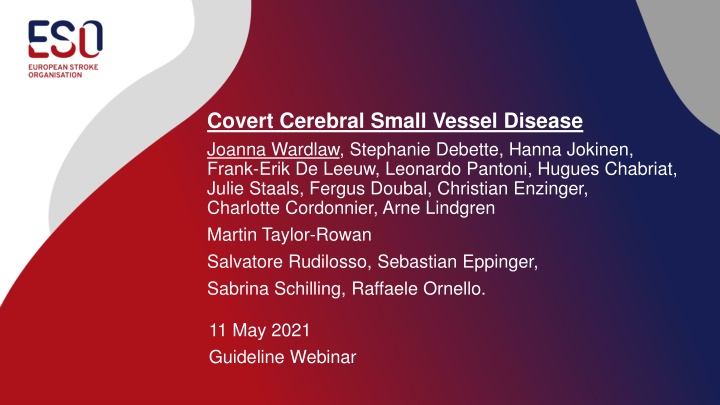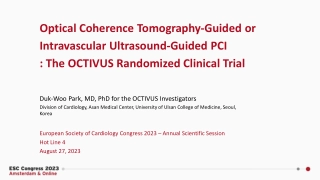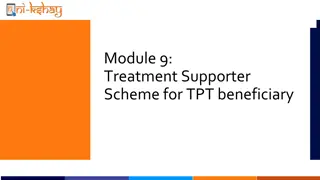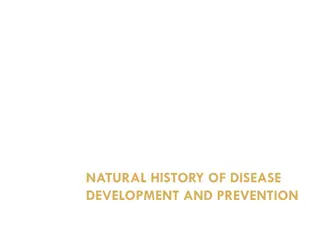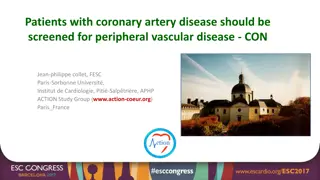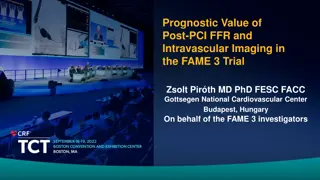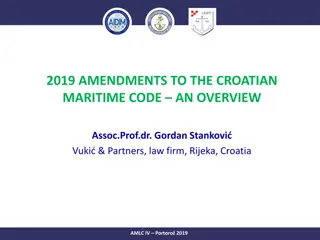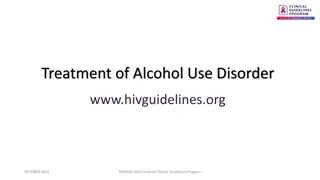Expert Guidelines on Treatment of Small Vessel Disease
Expert recommendations for the management of covert cerebral small vessel disease (ccSVD) emphasize the use of antihypertensive treatment for hypertensive patients to prevent SVD lesion progression. While there is limited evidence supporting intensive blood pressure lowering targets, systematic blood pressure lowering in normotensive ccSVD patients is not advised. Similarly, antiplatelet treatment is not recommended for ccSVD patients. Monitoring blood pressure and individualized care are key components of management.
Download Presentation

Please find below an Image/Link to download the presentation.
The content on the website is provided AS IS for your information and personal use only. It may not be sold, licensed, or shared on other websites without obtaining consent from the author.If you encounter any issues during the download, it is possible that the publisher has removed the file from their server.
You are allowed to download the files provided on this website for personal or commercial use, subject to the condition that they are used lawfully. All files are the property of their respective owners.
The content on the website is provided AS IS for your information and personal use only. It may not be sold, licensed, or shared on other websites without obtaining consent from the author.
E N D
Presentation Transcript
Covert Cerebral Small Vessel Disease Joanna Wardlaw, Stephanie Debette, Hanna Jokinen, Frank-Erik De Leeuw, Leonardo Pantoni, Hugues Chabriat, Julie Staals, Fergus Doubal, Christian Enzinger, Charlotte Cordonnier, Arne Lindgren Martin Taylor-Rowan Salvatore Rudilosso, Sebastian Eppinger, Sabrina Schilling, Raffaele Ornello. 11 May 2021 Guideline Webinar
Evidence-based Recommendations PICO 1.1 1.7 Does antihypertensive treatment, reduce ischaemic or haemorrhagic strokes (1.1), cognitive decline or dementia (1.2), dependency (1.3), death (1.4), MACE (1.5), mobility (1.6), or mood disorders (1.7) Evidence-based Recommendation We recommend the use of antihypertensive treatment in hypertensive ccSVD patients ( 140/90 mmHg), to prevent the extension of SVD lesions and related clinical manifestations. Quality of evidence: Very low Strength of recommendation: Strong for intervention 2540 papers; 93 full text; 2 RCTs, 1 observational study: 924 participants RCTs in primary & secondary prevention; IPD meta-analyses of observational studies; RCTs reporting WMH change meta-analysis
Expert Consensus Statement Antihypertensive treatment in ccSVD controlled. Provided that BP is well controlled we cannot advise any specific antihypertensive treatment. Most group members suggest that: For ccSVD patients, there is currently insufficient evidence to systematically advocate targeting BP levels lower than standard targets, although more intensive BP lowering than conventional BP lowering guidelines is associated with slower progression of WMH burden. All group members suggest that: In ccSVD patients in whom more intensive BP lowering targets are recommended for other reasons there is no strong evidence to suggest that this could be harmful. On current evidence the guideline group unanimously does not support systematic BP lowering in normotensive ccSVD patients. All group members suggest that: BP should be appropriately monitored and well
Evidence-based Recommendations PICO 2.1 2.7 Does antiplatelet treatment, reduce ischaemic or haemorrhagic strokes (2.1), cognitive decline or dementia (2.2), dependency (2.3), death (2.4), MACE (2.5), mobility (2.6), or mood disorders (2.7)? Evidence-based Recommendation We suggest against antiplatelet treatment in patients with ccSVD as a means to reduce the clinical outcome events of ischaemic or haemorrhagic strokes, cognitive decline or dementia, dependency, death, MACE, mobility, or mood disorders. Quality of evidence: Very low Strength of recommendation: Weak against intervention ? 1084 papers; 32 full text; 1 RCT; 83 participants RCTs & systematic reviews in primary (eg ASPREE, n=19114) and secondary prevention; large epidemiology studies (eg WHI)
Expert Consensus Statement Antiplatelet agents in ccSVD Most group members agreed that: We advise against use of antiplatelet drugs to prevent clinical outcomes in subjects with ccSVD when no other indication for this treatment exists. With current available knowledge, the use of antiplatelet drugs to prevent progression of cerebral SVD may be harmful in older patients (from around 70 years of age) if no other indication for this treatment exists.
Evidence-based Recommendations PICO 3.1 3.7 Does lipid lowering treatment reduce ischaemic or haemorrhagic strokes (2.1), cognitive decline or dementia (2.2), dependency (2.3), death (2.4), MACE (2.5), mobility (2.6), or mood disorders (2.7)? Evidence-based Recommendation We did not find enough evidence of high enough quality on prevention of clinical outcomes in ccSVD to make a definitive recommendation on lipid lowering. However we recognise that lipid lowering is effective in primary prevention in those at high risk of vascular events. Quality of evidence Very low Strength of recommendation - Weak for intervention ? 1153 papers; 16 full text; 4 RCTs; 547 participants RCTs in primary and secondary prevention; observational longitudinal and case-control studies; meta-analysis WMH change;
Expert Consensus Statement Lipid lowering treatment in ccSVD The group members were narrowly in favour that: Lipid lowering with statins could be considered in patients with ccSVD, even when no other indication for statin treatment exists, with the aim of delaying the progression of ccSVD, although the clinical implications of this delayed progression remain to be proven.
Evidence-based Recommendations PICO 4.1 4.7 Do lifestyle interventions [smoking cessation, weight reduction, dietary interventions, physical exercise, cognitive/social interventions, sleep/CPAP, or a mixture of these], compared to less intense or avoiding these interventions, reduce ischaemic or haemorrhagic strokes (4.1), cognitive decline or dementia (4.2), dependency (4.3), death (4.4), MACE (4.5), mobility (4.6), or mood disorders (4.7). Evidence-based Recommendation In patients with ccSVD, we suggest that physical exercise has beneficial effects on cognition and possibly also on mobility, incidence of cerebrovascular events and all-cause mortality, and therefore, recommend regular physical activity in general. However, we cannot make recommendations on a specific physical intervention based on current evidence. Quality of evidence: VeryLow Strength of recommendation: Weak for intervention ? In patients with ccSVD there is no clear evidence that other non-physical lifestyle interventions have beneficial effects on clinical outcomes. Quality of evidence: Very low Strength of recommendation: No recommendation 2742 papers; 79 full text; 10 studies; 2211 participants; RCTs, systematic reviews, meta-analyses, observational studies in primary and secondary prevention
Expert Consensus Statement Lifestyle interventions in ccSVD All group members suggest that: There is no direct evidence to suggest that any specific lifestyle interventions prevent clinical outcomes in patients with ccSVD. However it is reasonable to promote healthy lifestyle interventions as recommended in primary prevention for vascular disease (including but not limited to maintaining healthy body weight, promoting exercise, avoiding smoking and excess alcohol, eating a healthy, balanced diet) in patients with ccSVD.
Evidence-based Recommendations PICO 5.1 5.7 Do drugs which reduce plasma glucose levels reduce ischaemic or haemorrhagic strokes (2.1), cognitive decline or dementia (2.2), dependency (2.3), death (2.4), MACE (2.5), mobility (2.6), or mood disorders (2.7)? Evidence-based Recommendation In patients with diabetes who may also have ccSVD, we recommend the use of current guideline-based glucose lowering therapies, including recommended glucose and HbA1C targets, as appropriate to the management of the individual patient s diabetes. There is no justification for recommending any particular glucose-lowering therapy for this purpose. We suggest against glucose lowering in patients with ccSVD who do not have any indication for glucose control. Quality of evidence: Very low Strength of recommendation: No recommendation 372 papers; 14 full text; 0 RCTs Cochrane review DM therapies; ACCORD-MIND RCT; Meta-analyses; diabetes guidelines;
Expert Consensus Statement Glucose lowering therapies in ccSVD All group members agree that in prediabetic or diabetic patients with ccSVD: Glycemic level should be appropriately monitored so as to be controlled according to the standards of medical care. We cannot advise any specific agent for obtaining appropriate glycemic control. There is currently insufficient evidence to recommend targeting a specific glucose or HbA1c level distinct from the standard targets. There is no evidence to support any therapeutic intervention to reduce the normal glucose level.
Evidence-based Recommendations PICO 6.1 Do conventional anti-dementia drugs [e.g. memantine, donepezil, galantamine, rivastigmine, etc.] reduce cognitive decline or dementia.? Evidence-based Recommendation In patients with ccSVD, we suggest against the use of conventional anti-dementia drugs, including cholinesterase inhibitors or memantine, as a means to reduce cognitive decline or dementia. Quality of evidence: Very low Strength of recommendation: Weak against intervention ? 123 studies; 20 full text; 1 RCT; n=72 Cochrane reviews of cholinesterase inhibitors, Ginkgo Biloba; RCT donepezil in CADASIL; other misc.
Expert Consensus Statement Conventional anti-dementia treatments in ccSVD Most group members suggest that: Considering the current lack of evidence for cholinesterase inhibitors and memantine in patients with ccSVD, and the small effects, at most, in patients with VCI or vascular dementia, we advise against prescribing these anti-dementia drugs in patients with ccSVD to prevent or reduce cognitive decline. All group members suggest that: There is insufficient evidence for the use of any other anti-dementia drugs in patients with ccSVD to prevent or reduce cognitive decline.
Download this guideline here. Or on MAGICapp.
